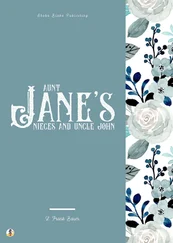Ouida - A House-Party, Don Gesualdo, and A Rainy June
Здесь есть возможность читать онлайн «Ouida - A House-Party, Don Gesualdo, and A Rainy June» — ознакомительный отрывок электронной книги совершенно бесплатно, а после прочтения отрывка купить полную версию. В некоторых случаях можно слушать аудио, скачать через торрент в формате fb2 и присутствует краткое содержание. Жанр: foreign_prose, literature_19, foreign_antique, на английском языке. Описание произведения, (предисловие) а так же отзывы посетителей доступны на портале библиотеки ЛибКат.
- Название:A House-Party, Don Gesualdo, and A Rainy June
- Автор:
- Жанр:
- Год:неизвестен
- ISBN:нет данных
- Рейтинг книги:4 / 5. Голосов: 1
-
Избранное:Добавить в избранное
- Отзывы:
-
Ваша оценка:
- 80
- 1
- 2
- 3
- 4
- 5
A House-Party, Don Gesualdo, and A Rainy June: краткое содержание, описание и аннотация
Предлагаем к чтению аннотацию, описание, краткое содержание или предисловие (зависит от того, что написал сам автор книги «A House-Party, Don Gesualdo, and A Rainy June»). Если вы не нашли необходимую информацию о книге — напишите в комментариях, мы постараемся отыскать её.
A House-Party, Don Gesualdo, and A Rainy June — читать онлайн ознакомительный отрывок
Ниже представлен текст книги, разбитый по страницам. Система сохранения места последней прочитанной страницы, позволяет с удобством читать онлайн бесплатно книгу «A House-Party, Don Gesualdo, and A Rainy June», без необходимости каждый раз заново искать на чём Вы остановились. Поставьте закладку, и сможете в любой момент перейти на страницу, на которой закончили чтение.
Интервал:
Закладка:
"The march of intellect, my dear George," says Brandolin; "neither le bon Dieu nor we are great folks any longer."
"Well, I think it's a pity," sighs Usk. "Everybody was happier then, and jollier too, though we do tear about so to try and get amused."
"There is still nothing to prevent you going to sleep in the big pew if it pleases you," replies Brandolin; "and Lawrence Hamilton always goes that he may look at Mrs. Curzon's profile as she sings: she is really saintly then. I think Sunday service is to Englishwomen what confession is to Catholic ladies: it sweeps all the blots off the week's tablets. It is convenient, if illogical."
"You are very irreligious," says his host, who is invariably orthodox when orthodoxy doesn't interfere with anything.
"Not more so than most people," says Brandolin. "I have even felt religious when I have been alone in the savannas or in the jungle. I don't feel so in a wooden box covered with red velvet, with a curate bawling in my ears about the hewing in pieces of Agag."
"That's nothing to do with it," says Usk: "we're bound to set an example."
"That's why you doze in public, and Mrs. Curzon wears her big pearls, to lead the school-children in the way they should go."
"That's nothing to do with it," repeats Lord Usk, somewhat crossly. He has a comfortable if indistinct idea that he does something patriotic, patriarchal, and highly praiseworthy in getting up an hour earlier than usual one Sunday out of three, and putting on a tall hat, a frock-coat, and a pair of new gloves, to attend the village church for morning service when he is at Orme, Denton, or Surrenden in fine weather.
If he sleeps, what of that? There are curtains to the pew, and nobody sees him except the Babe, who takes fiendish rapture in catching big flies and releasing them from a careful little hand to alight on his father's forehead or nose. The Babe would define the Sunday morning as a horrid bore tempered by blue-bottles.
"What a curiously conventional mind is the English mind!" thinks Brandolin, when he is alone. "Carlisle is right: the gig is its standard. The gig is out of fashion as a vehicle, but the national mind remains the same as in the age of gigs,—content with the outside of things, clinging to the husk, to the shell, to the outward appearance, and satisfied with these. My dear friend puts on his chimney-pot, then takes it off and snores in his pew, and thinks that he has done something holy which will sustain both Church and State, as he thinks that he prays when he buries his face in his hat and creases his trousers on a hassock! Mysterious consolations of the unfathomable human breast!"
CHAPTER V
A few new people have come by the brake, and make their appearance at luncheon. More come by the five-o'clock train, and are visible at six-o'clock tea, which is always to be had in the library any time before seven: dinner at all the Usk houses is always at nine. Brandolin's doctrines do not prevail with any of his acquaintances, although he, unlike most professors, emphasizes them by example.
Among the people who come by the latter train are the famous Mr. Wootton, a man very famous at London dinner-parties, and Lady Gundrede Vansittart, whose dinners are the best in London.
"Where would those two people be if you brought the pulse and the rice you recommend into fashion?" says their host to Brandolin. "Take 'em away from the table, they'd be good for nothing. He wouldn't say 'Bo' to a goose, and she wouldn't be worth leaving a card upon. Believe me, my dear Guy, such esprit as there is left in us is only brought out by eating."
"I think you invert all your reasonings," says Brandolin. "Say rather, that too much eating has destroyed all esprit . Don't we eat all day long everywhere, or at least are expected to do so? You lament your ruined digestion. It is impossible to digest when time is only counted by what our beloved Yankees call square meals (why square I fail to fathom), and for women it is worse than for us, because they eat such quantities of sweet things we don't touch, and then the way they go in for caviare bread-and-butter, and anchovy sandwiches, and all kinds of rich cakes, and deux doigts de Madère or glasses of kümmel at the tea-hour,—it is frightful! I wonder they have any complexions at all left, even with the assistance of all the ' secrets de Vénus .'"
"You won't alter 'em, my dear fellow," replies Usk, "if you put yourself out about it ever so much. If you were to marry a savage out of Formosa, or an Esquimaux, she'd take kindly to the caviare and the kümmel before a week was out, if you brought her to Europe. Why, look at dogs,—you may keep 'em on biscuit and tripe if they live in the kennels, but if they once come to the dining-room they'll turn their noses up at a beef-steak if it isn't truffled!"
"Dogs, at least, stop short of the kümmel," says Brandolin; "but if you were to put together the sherry, the dry champagne, the liqueurs at tea, the brandy in the chasse at dinner, which a fashionable woman takes in the course of the day (not counting any pick-me-up that she may require in her own room), the amount would be something enormous,—incredible! You would not believe the number of women who have cured me of an unhappy passion for them by letting me see what a lot they could drink."
"You will adore the Sabaroff, then. She never touches anything that I see, except tea."
"Admirable person! I am ready to adore her. Tell me more about her. By the way, who is she?"
"Oh, you must go to Dolly for biographies of her foreigners. I can't keep even their names in my head."
"Foreigners! What an expression!" cries Dorothy Usk, in disdain. "Since steam effaced frontiers, nobody but insular people like ourselves ever use such a term. Nationalities are obliterated."
She is very fond of Xenia Sabaroff: she has a great many warm attachments to women who help to make her house attractive.
"Nationalities are still discernible in different tobaccos," murmurs Brandolin. "The Havana won't acknowledge an equal in the Cavour."
"Dolly don't know anything about her," continues Usk, clinging to the subject.
"Oh, my dear!" cried his wife, shocked, "when she is the niece of the great Chancellor and her mother was a Princess Dourtza."
"You don't know anything about her," repeats Usk, with that unpleasant obstinacy characteristic of men when they talk to their wives. "You met her in Vienna and took one of your crazes for her, and she may have sent a score of lovers to Siberia, or deserve to go there herself, for anything you can tell. One can never be sure of anything about foreigners."
"How absurd you are, and how insular !" cries Dorothy Usk, again. "'Foreigners!' As if there were any foreigners in these days, when Europe is like one family!"
"A family which, like most families, squabbles and scratches pretty often, then," says Usk,—which seems to his wife a reply too vulgar to be worthy of contradiction. He is conscious that Xenia Sabaroff is a very great lady, and that her quarterings, backed by descent and alliance, are wholly irreproachable,—indeed, written in that libro d'oro , the "Almanach de Gotha," for all who choose to read.
Her descent and her diamonds are alike immaculate, but her character?—he is too old-fashioned a Briton not to think it very probable that there is something louche there.
Usk is a Russophobist, as becomes a true Tory. He has a rooted impression that all Russians are spies when they are not swindlers; much as in the early years of the century his grandsire had been positive that all Frenchmen were assassins when they were not dancing-masters. The White Czar has replaced the Petit Caporal, and the fur cap the cocked hat, in the eyes of Englishmen of Usk's type, as an object of dread and detestation. He would never be in the least surprised if it turned out that the real object of Madame Sabaroff's visit to Surrenden were to have possible opportunities to examine the facilities of Weymouth as a landing-place for Cossacks out of Muscovite corvettes.
Читать дальшеИнтервал:
Закладка:
Похожие книги на «A House-Party, Don Gesualdo, and A Rainy June»
Представляем Вашему вниманию похожие книги на «A House-Party, Don Gesualdo, and A Rainy June» списком для выбора. Мы отобрали схожую по названию и смыслу литературу в надежде предоставить читателям больше вариантов отыскать новые, интересные, ещё непрочитанные произведения.
Обсуждение, отзывы о книге «A House-Party, Don Gesualdo, and A Rainy June» и просто собственные мнения читателей. Оставьте ваши комментарии, напишите, что Вы думаете о произведении, его смысле или главных героях. Укажите что конкретно понравилось, а что нет, и почему Вы так считаете.












